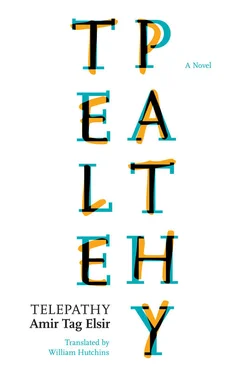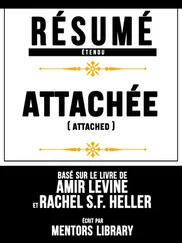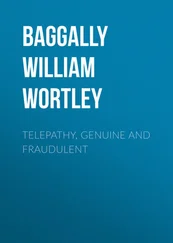“No need for that,” he replied. “I borrowed my daughter Linda’s copy after she read it. She’ll certainly discuss it with you.”
He lifted the pillow he had been leaning on, and a copy of the novel with its covers ripped off lay there. A sliver of wood that served as a bookmark poked from it. He did not ask me to sign it for his daughter, Linda. This was one of my great complaints about the Shadow — that he did not acknowledge the practice of signing books. He accepted unsigned copies of books and never signed published copies of his plays for anyone.
I traversed the streets of the Zahra District, driving slowly while I read the numerous signboards, which had multiplied in an astonishing way in the last few years. They advertised liposuction clinics, modern dental clinics that offered dentures with Hollywood-actress smiles, hair salons that listed services including blow-drying, perms, and coloring, tinsmiths, barbers, attorneys, legal accountants, and purveyors of conjugal happiness crèmes and pomades that grew lost hair. One clinic was devoted to the care of Akita dogs, bull terriers, and bulldogs. Another offered compressed oxygen technology for diabetics’ injuries. It occurred to me that the entire country was selling something. I didn’t know, though, who could be consuming all this — certainly not Nishan Hamza or the other inhabitants of his peripheral district, which had been settled by migrants, watchmen, and low-paid laborers. They would never buy a crème for conjugal happiness or a pomade to re-grow hair.
I found myself forced to think about Nishan again, after having forgotten him for some minutes. I brooded about ways that my secluded life would need to change and about how I was to handle adopting this lunatic.
Did I feel guilty for having “written” him?
I didn’t know; it would have been unfair to expect me to feel guilty when I hadn’t stolen anyone’s particular characteristics. Something uncanny had organized it all and guided everything. I had released a novel that would neither enrich me nor add a new meteor or thrilling satellite to the universe.
Suddenly I caught sight of Professor Hazaz, the reflexology specialist whose lecture at the Social Harmony Club had so bored me that I had walked out only to be confronted by Nishan. Professor Hazaz, who was wearing a light green shirt and black trousers, climbed out of a late-model car — a red American Hummer — and glided swiftly into a white five-story building halfway down the main street. I looked up and down, taking in the whole building, and noticed a large sign on which was inscribed in elegant, sinuous letters: “Dr Sabir Hazaz, Specialist in Reflexology Medicine.”
I smiled in spite of myself on seeing the skill of a simple masseur — like Musamih, who drove a Mitsubishi Rosa bus for the public transport authority and who was one of Malikat al-Dar’s sons-in-law, and even by Umm Salama, who cooked and cleaned for me — practiced by this “Reflexologist” who drove an expensive Hummer, a brand that was virtually nonexistent in the country. On the other hand, an author who summoned and corralled ideas in his mind, where he reconfigured them before depositing them onto the pages of a difficult novel, might only too easily find himself entering prison or taking a one-way ride in a hearse.
I really did not envy Hazaz. The comparison between us was extraneous but inevitable for me at a moment when I was deciding whether I should continue to be a writer — plagued by the lunatic Nishan and other catastrophes — or return to my former career as a teacher of mathematics, the simplest principles of which I had forgotten and would be forced to review. I remembered that a man who used to manage an investment firm had once informed me that he loved my writing and wished to help me create a large and dependable income. All I had to do was shell out a small sum that I would watch grow before my very eyes; I wouldn’t believe it once I was transformed from a mere writer with limited resources into a wealthy capitalist. I handed over to him whatever I could spare for five years and waited. It came as a grim surprise to me when the investment firm folded suddenly, its proprietor vanished, and I discovered that its former offices were an institute where some woman taught exotic dancing.
I noted the Reflexology Clinic’s address in my agitated mind to remember it should I need to visit for some reason, and then quit the Zahra District and its environs.
My destination was exceedingly odd for a person like me. I was heading to the working-class Aisha Market, on the capital’s eastern edge, to search for Joseph Ifranji, a Southerner who had separated from the South when it separated from the North, even though all the other members of his family had migrated to the new nation. He had worked as a messenger in the school where I once taught. Now he was worthily unemployed in the Aisha Market, where he was attempting to enter commerce by any door he thought open, since he could not enter the world of middlemen through upscale revolving doors. I wanted Ifranji to be part of the changes I was introducing into my life. In fact, I wanted to hire him to handle my headache’s ground zero by taking full charge of Nishan Hamza. I didn’t think he would object. Indeed, this was an opportunity not to be sniffed at. Seen from Ifranji’s perspective, the job would offer him a chance to relax, even if his companion would be a lunatic who had died in my novel and who in real life was threatened with death.
I had given up teaching more than twelve years earlier. Back then, Joseph Ifranji had been a slender-kneed boy who loved to run, to hunt plump birds, and to scale houses to collect trinkets. I had last seen him six weeks earlier when he had informed me that his wife, Ashul, had left, taking their son, whom he had named Mahogany in honor of a tree he had never seen. He had heard the name by chance while making his rounds in the market. His wife had deserted him for the new nation. Now his son was certainly eating clods of dirt in a fatherland that had yet to achieve its dream. It was hardly out of the question that the child would die of malaria, sleeping sickness, or any other of many ailments. I had cheered him up considerably that day by giving him five pounds. I had also informed him — even though I rarely tell anyone — that I had based a character partly on him in a work I had started years ago but had never finished. Now it was one of the texts I refer to as abandoned. Ifranji had seemed neither happy nor disappointed and had shown no curiosity about the character I based on him. Instead, he demanded ten more pounds and departed, wearing a soiled, wrinkled shirt and sandals that were torn in more than one place.
We entered Wadi al-Hikma after more than an hour and a half of slow, awkward driving through anarchy and unbearable traffic jams. A truck driver who had “All Days Are One, My Love” painted on the back of his vehicle abused me with crazed persistence and cursed me vilely. Countless beggars weaved through the hubbub, heedless of the danger. Vendors hawked cheap pens, tissues, and dirty cloth bags insistently. The homeless boys who clog the capital’s streets rubbed filthy rags on car windows and demanded payment for their services.
The day was fading away. In another hour, night would have set up camp with its pains and suspicions. Ifranji was on my right, rebellious and anxious but eager for this assignment that he didn’t really understand, even though I had sketched it out for him. During the hours he spent with me in the Aisha Market and the Nu‘man Real Estate Office, where I had rented a small, unpretentious house, and during the ride in my car, he had conjured up myriad characters. These included a bodyguard, an intensive care nurse, an alert watchman in an hour of danger. He would need to play all these roles while he looked after Nishan in order to allow me first to find him treatment for his schizophrenia and then to research how probable it was that he would eventually contract glandular cancer.
Читать дальше












